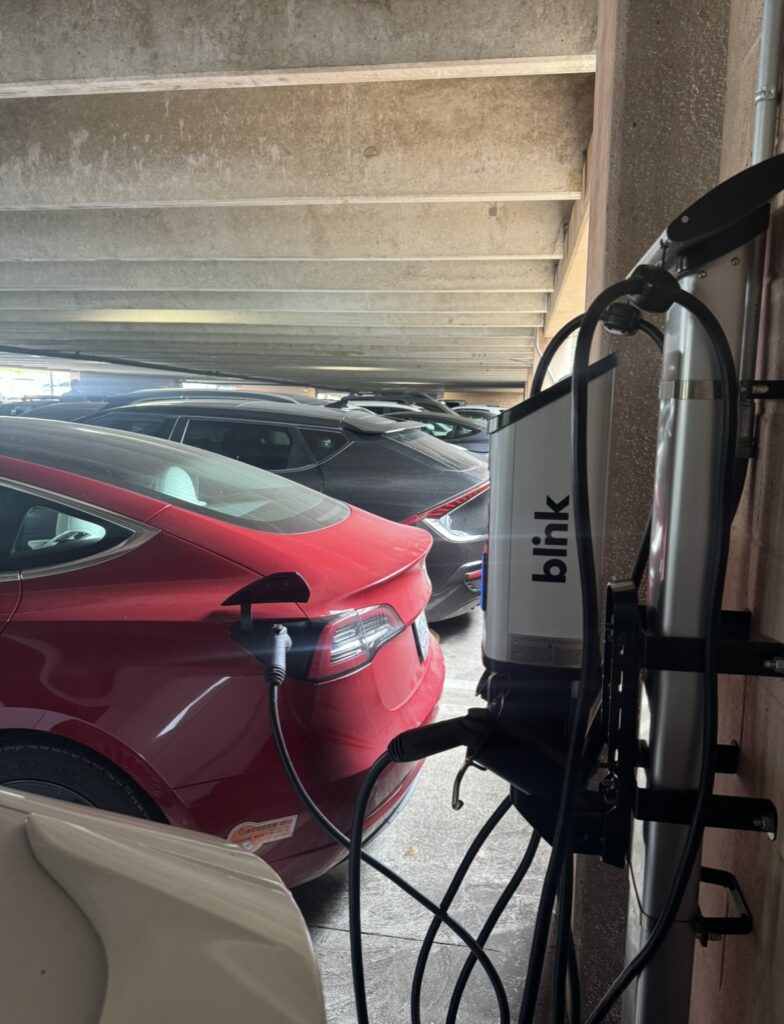*Editor’s Note: This version has been updated with information on the Blink charging stations which was sent by PLNU’s associate vice president of facility operations and campus planning, Dan Toro, via email on Oct. 11 and 14.
As sustainability becomes a growing priority worldwide, Point Loma Nazarene University is no exception. Dan Toro, PLNU associate vice president of facility operations and campus planning, said the campus expanded its electric vehicle (EV) infrastructure with eight new Blink charging stations in the commuter parking lot.
On Oct. 11, Toro announced to the student body via email that the new EV stations were ready for use.

Though initially saying the charging would be free, Toro sent a second email on Oct. 14 that there will be a cost starting in the spring semester.
“EV charging will be complimentary for the duration of the fall semester as PLNU prepares to implement a time-of-use fee structure for the spring semester,” Toro said via email. “Under this fee structure, those charging will pay the price per K/wh (kilowatt-hour) designated by SDGE (San Diego Gas and Electric) in their time-of-use fee structure for electricity,” Toro said.
PLNU’s commitment to sustainability extends beyond just providing the EV charging options. In 2007, the university signed the Second Nature Carbon Commitment and pledged to become carbon neutral by 2050. This pledge offers EV chargers and aims to transition all campus vehicles, like shuttles and golf carts, from fossil fuels to electric power.
According to Kaz Trypuc, the assistant director of public safety, the number of EVs on campus is increasing.
“Based on vehicle registration information, students registered 18 Teslas in 2022-23, 19 in 2023-24 and 39 in 2024-25,” Trypuc said.
Charging stations have become an essential part of campus life for many EV drivers, especially commuter students like Jacob Smith, a fourth-year business student.
Smith said he relies heavily on the free charging stations located near Flex Housing and Nease Hall, and that because of the free charging, he saves a significant amount of money each month.
“I am beyond grateful for the free charging … and as a commuter with a 30-mile commute, I rely on it almost daily,” Smith said.
One recurring issue among EV drivers is the misuse of designated charging spaces by non-EV vehicles. Smith said that while the problem is less frequent this year, it still happens.
“I believe the issue pops up the most when the parking near the Fermanian School of Business runs out and late students are desperate to park anywhere to get to class,” Smith said.
Trypuc mentioned that parking violations, including parking non-electric cars in EV spots, could result in citations, however it is not that simple.
“The nature of EV charging stations and their specific rules make them uniquely challenging to enforce compared to other parking spaces,” Trypuc said. “For example, electric vehicles staying beyond the four hour limit can be harder to monitor because they require long-term observation.”
However, Smith believes that enforcing existing rules more strictly could improve the situation.
“There is technically a four hour limit before we are asked to move our cars to give others the opportunity to park there, but this is never enforced,” Smith said. “Just putting warning notes in a windshield could go a long way.”
The charging options, combined with the university’s proximity to the ocean, have incentivised driving an EV for both economic and environmental reasons.
“Sustainability is particularly important at PLNU because of our location,” Gustavo Bernal, assistant director of campus facilities, service management, said. “Being right on the coast, our actions as a university have a significant impact on the surrounding coastal ecosystem of sunset cliffs.”
PLNU’s approach to sustainability covers environmental, social and economic aspects, which recognizes the importance of helping the planet for future generations. The university’s sustainability efforts, including its promotion of EVs, align with the broader mission of being responsible citizens of the environment, which is a value that is reinforced by PLNU’s Christian foundation.
Supporting EV drivers and expanding infrastructure is a step toward a more sustainable future. With the university’s ongoing dedication to reducing its carbon footprint, the EV movement is set to grow alongside the campus’s overall sustainability goals.
